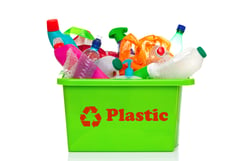 As sustainability concerns continue to remain at the forefront of packaging decisions, especially in the plastics industry, recycling plays an increasingly important role in the effort to reduce packaging discards and overall solid waste levels. The following is a guest post and infographic from our friends at Perfect Rubber Mulch outlining some of the common myths and misconceptions about recycling:
As sustainability concerns continue to remain at the forefront of packaging decisions, especially in the plastics industry, recycling plays an increasingly important role in the effort to reduce packaging discards and overall solid waste levels. The following is a guest post and infographic from our friends at Perfect Rubber Mulch outlining some of the common myths and misconceptions about recycling:
The recycling bin has become a familiar part of everyday life. Yet you may be surprised to learn that curbside recycling services in the United States are a relatively recent phenomenon. Although it’s impressive that modern society has been able to adapt to such an ecologically responsible practice so quickly, that also means that recycling isn’t always understood as well as it should be by many people. The speed with which recycling has become a part of our daily lives means many people still have questions about the process and its benefits. Unfortunately, this also means a lot of misinformation continues to circulate about recycling.
Many of the most common myths about recycling are harmful because they can convince some people that recycling doesn’t make a difference, or that it can do more harm than good. The damage these myths can do can discourage people from recycling, which means more waste ending up in landfills and more natural resources being consumed that don’t need to be. For example, some people believe that recycling is a waste of time because they think garbage eventually decomposes anyway. Although it’s true that almost all materials break down over time, plastics can take up to 1,000 years to fully decompose in a landfill. That means that a plastic bottle manufactured to hold a sports drink for less than a week can spend several centuries in a landfill afterward. Another common myth is the idea that recycling uses more energy than it saves. However, recycling aluminum cans, for example, requires 95 percent less energy than manufacturing them from raw materials.
Recycling may be a relatively new concept, but it’s an important one for the continued sustainability of modern society. Check out the infographic below for a list of the most common myths about recycling as well as the facts:

Graphic & content for this post provided by Perfect Rubber Mulch.
Author bio: Penny Klein, Owner of Perfect Rubber Mulch, has extensive experience in the industry and understands the best product fit for her clients’ needs. She works with customers to guarantee the right amount of product is purchased, and makes certain the delivery process is best in class.
Visit our website for more information about the Impact Plastics' commitment to sustainability, or contact our team today!




